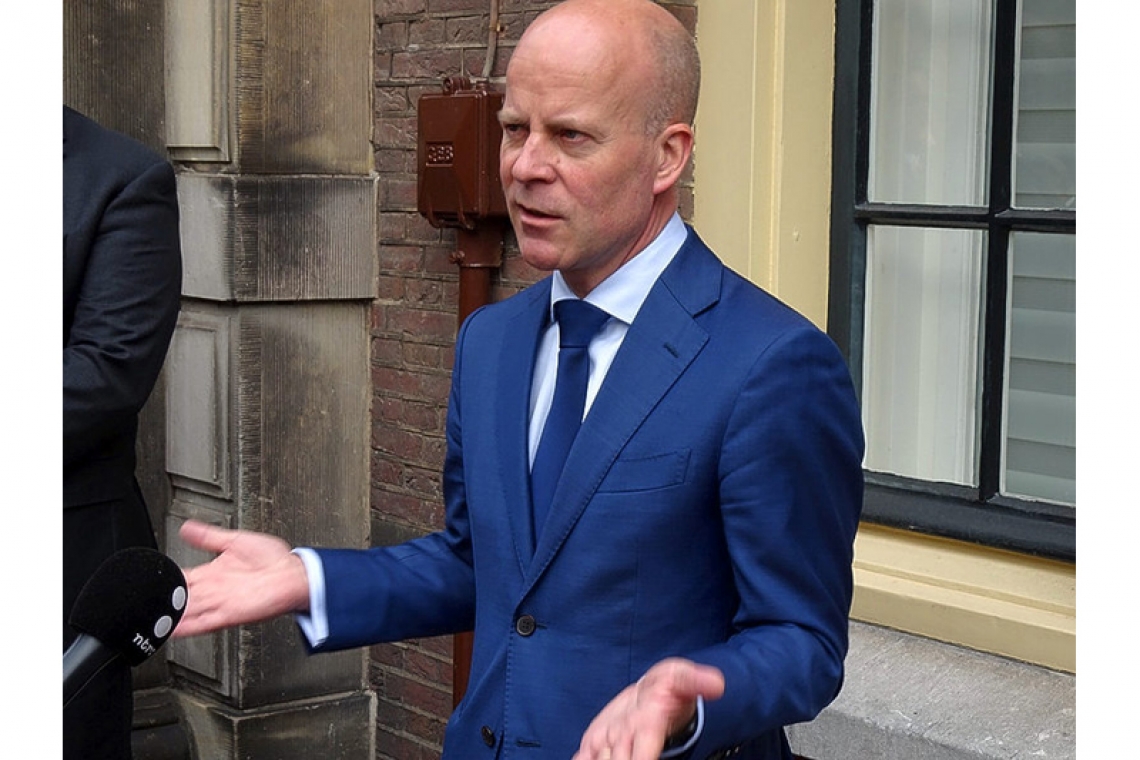State Secretary Raymond Knops being interviewed after the April 9 Kingdom Council of Ministers meeting. (Suzanne Koelega photo)
THE HAGUE--The Dutch Caribbean countries have barely complied in the past with agreements to realise balanced and timely budgets, to improve financial management and invest in good government. For this reason, the Kingdom government will set extensive conditions for additional financial assistance.
State Secretary of Home Affairs and Kingdom Relations Raymond Knops stated this in a letter he sent to the Second Chamber of the Dutch Parliament on Thursday to provide information on the April 9 decisions of the Kingdom Council of Ministers regarding financial support for Aruba, Curaçao and St. Maarten.
The Kingdom Council of Ministers has decided to make the additional loans dependent on a package of measures that are focused on structural reform. According to Knops, insufficient follow-up has been given in previous years to the agreements that were made with the countries to decrease their vulnerability. The Committee for Financial Supervision of Curaçao and St. Maarten CFT, Aruba Committee for Financial Supervision CAFT and the International Monetary Fund (IMF) have repeatedly pointed out the need for structural reform.
Budget regulations have not been lived up to, more robust governments and more sustainable public finances were not achieved. “Also, programmes to strengthen government and the civil apparatus have had little to no effect. As a result of this, there has been no building-up of financial, institutional and social resilience, and of a government structure that can handle crises, of whatever nature, well,” Knops stated.
Considering these facts from experience, the Kingdom government will tie conditions to additional financial support. Mentioned in the letter were conditions in the area of economy, the labour market, the capital market, the pension system, the social insurance system, the health care system and the government organisation. The objective is to make the countries more resilient.
The Kingdom government agreed on April 9 to provide liquidity support to the three countries for April and May: Afl. 42.8 million for Aruba, NAf. 177 million for Curaçao and NAf. 50.2 million for St. Maarten. It concerns zero-per-cent loans with no repayment for two years.
The Kingdom Council of Ministers indicated that the amounts, which were immediately transferred to the Central Bank of Curaçao and St. Maarten and the Central Bank of Aruba, were to be mostly used for “that part of the community that is being hit hardest, who most feel the effects of this crisis and where the needs are the most urgent.”
In other words, the liquidity support is mainly meant to execute emergency measures of the autonomous countries to assist persons who lost their jobs and to make sure that people do not go hungry. The funding is not meant for paying civil servants or to cover government expenditures that are not related to COVID-19.
For St. Maarten, three million euros were deducted from the NAf. 50.2 million liquidity support to pay the bill for housing St. Maarten inmates in the Netherlands since Hurricane Irma. For St. Maarten it concerned liquidity support for 2019 to cover the detrimental effects of the hurricane.
St. Maarten complied with the first condition to receive the liquidity support: for the elected officials to take a 10-per-cent pay-cut. The second condition, to include the cost of assistance by the Netherlands National Police and to improve the detention facilities in the 2019 and 2020 budgets, can only be met when the 2020 budget has been adopted by the St. Maarten Parliament. This budget needs to be presented before May 1.
Knops remarked that the intention of the St. Maarten Members of Parliament and members of the Council of Ministers to take a 10 per cent pay-cut still needs to be secured in legislation. He stated that even though he appreciated a similar initiative of elected officials in Aruba and Curaçao, this was not enough.
“Naturally, I appreciate this gesture. But it cannot be limited to this. A levelling of top incomes is needed for the entire government, including the government-owned companies, as a condition to provide additional liquidity support to the countries,” he stated.
As autonomous countries, Aruba, Curaçao and St. Maarten are responsible for their own financial-economic policy. Due to the exceptional situation created by the corona crisis, the countries have requested financial support from the Netherlands.
The liquidity support will enable the countries to comply with their financial obligations. “Depending on the duration of the crisis, additional support will be necessary for the middle and long term to keep the government finances in check and to finance the (economic) emergency packages,” stated Knops.
The plans drafted by the individual countries will be assessed by the CFT and the CAFT and handled at the next Kingdom Council of Ministers meeting, slated for May 14.
Knops, who returned as State Secretary earlier this week after having served as Minister for some five months to temporarily replace Kajsa Ollongren, acknowledged that the Dutch Caribbean countries are going through very rough times. “It is clear that the economies are being hit extremely hard, with major consequences for the government finances, the income of workers and the profits of companies.”
The countries have been hit extra hard because of the already vulnerable state of their government finances, the tourism-dependent economy, the poverty among their people, the often inequal division between rich and poor, and the limited capacity of government, explained Knops.







